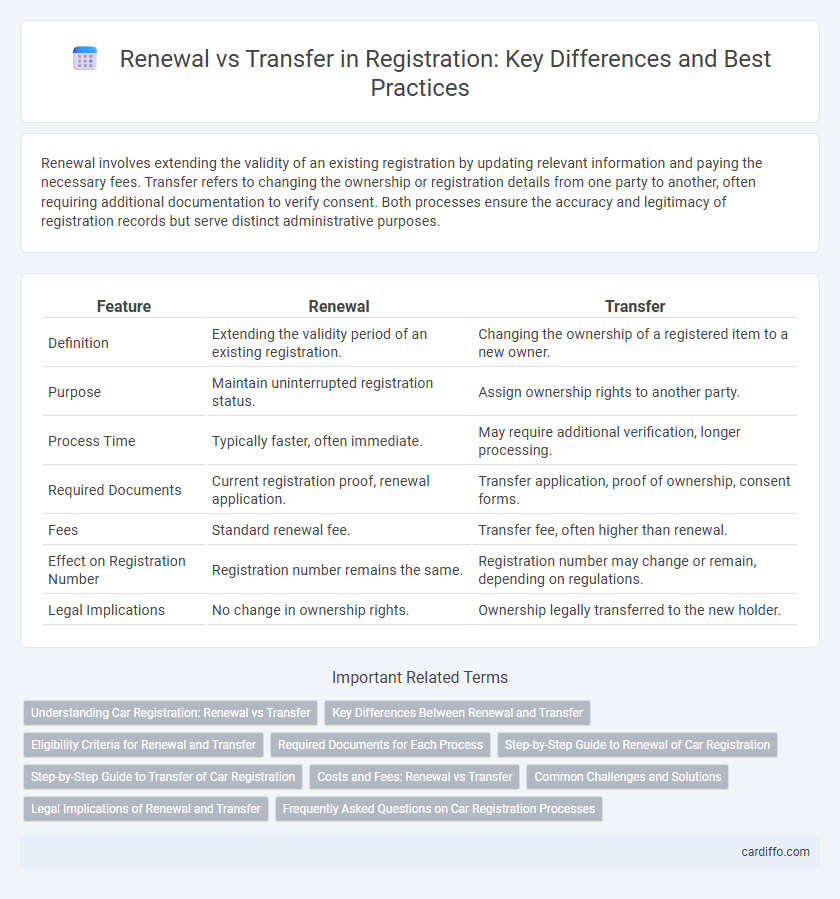Renewal involves extending the validity of an existing registration by updating relevant information and paying the necessary fees. Transfer refers to changing the ownership or registration details from one party to another, often requiring additional documentation to verify consent. Both processes ensure the accuracy and legitimacy of registration records but serve distinct administrative purposes.
Table of Comparison
| Feature | Renewal | Transfer |
|---|---|---|
| Definition | Extending the validity period of an existing registration. | Changing the ownership of a registered item to a new owner. |
| Purpose | Maintain uninterrupted registration status. | Assign ownership rights to another party. |
| Process Time | Typically faster, often immediate. | May require additional verification, longer processing. |
| Required Documents | Current registration proof, renewal application. | Transfer application, proof of ownership, consent forms. |
| Fees | Standard renewal fee. | Transfer fee, often higher than renewal. |
| Effect on Registration Number | Registration number remains the same. | Registration number may change or remain, depending on regulations. |
| Legal Implications | No change in ownership rights. | Ownership legally transferred to the new holder. |
Understanding Car Registration: Renewal vs Transfer
Car registration renewal involves extending the validity of an existing vehicle registration to maintain legal operation, typically requiring updated documentation and fee payment to the local DMV. Transfer of registration occurs when ownership changes, necessitating submission of a title transfer, proof of insurance, and payment of applicable taxes or fees to reassign the registration to the new owner. Understanding these processes ensures compliance with state regulations and avoids penalties related to expired or improperly transferred vehicle registrations.
Key Differences Between Renewal and Transfer
Renewal involves updating or extending the validity of an existing registration without changing ownership, typically requiring current proof of eligibility and payment of fees. Transfer refers to the process of changing ownership or registration rights from one party to another, often necessitating documentation of the transfer agreement and verification of the new owner's credentials. Key differences include the fact that renewal maintains the same registrant, while transfer legally shifts control to a different individual or entity.
Eligibility Criteria for Renewal and Transfer
Renewal eligibility requires current registration status and completion within the specified expiration period to avoid penalties or lapses. Transfer eligibility necessitates active registration in the original jurisdiction and compliance with both the release and acceptance criteria of the new registration authority. Verifying documentation such as proof of identity, residency, and payment of applicable fees is essential for both renewal and transfer processes.
Required Documents for Each Process
Renewal requires documents such as the current registration certificate, proof of identity, proof of address, and payment of renewal fees. Transfer demands additional paperwork including the original registration certificate, a signed NOC (No Objection Certificate) from the current owner, valid insurance documents, and proof of address for both parties. Ensuring all required documents are accurately submitted expedites the processing time for either renewal or transfer of registration.
Step-by-Step Guide to Renewal of Car Registration
To renew car registration, start by gathering essential documents such as the current registration card, proof of insurance, and emissions test results if required. Next, visit the local DMV website or office to complete the renewal application and pay the applicable fees, either online or in person. Finally, receive the updated registration sticker or card, ensuring your vehicle complies with state regulations and remains legally registered.
Step-by-Step Guide to Transfer of Car Registration
To transfer car registration, first gather essential documents including the original registration certificate, proof of insurance, and a valid identification card. Submit these along with a completed application form to the local motor vehicle department or online portal, ensuring payment of the applicable transfer fees. Finally, receive the updated registration certificate reflecting the new owner's details, completing the transfer process efficiently.
Costs and Fees: Renewal vs Transfer
Renewal fees typically involve a lower, fixed cost focused on extending the existing registration period, whereas transfer fees often include a higher, variable cost that covers administrative processing and ownership change verification. Renewal costs are usually scheduled annually or biennially with minimal additional charges, while transfer fees may incorporate taxes, lien searches, and title update expenses. Understanding these distinctions helps in budgeting appropriately for either extending current registrations or transferring ownership.
Common Challenges and Solutions
Renewal processes often face challenges such as outdated documentation and payment errors, while transfer procedures commonly encounter issues like verification delays and ownership disputes. Solutions include implementing automated verification systems and providing clear guidelines to streamline both renewal and transfer applications. Consistent communication and timely updates reduce user frustration and improve registration accuracy.
Legal Implications of Renewal and Transfer
Renewal of registration legally extends the original agreement's terms, maintaining continuous compliance with regulatory requirements and avoiding penalties or lapses in legal status. Transfer of registration involves a change in ownership or rights, necessitating new legal documentation, potential verification processes, and compliance with transfer-specific statutes. Failure to properly execute renewal or transfer can result in administrative fines, invalidation of the registration, or loss of legal protections associated with the registered entity.
Frequently Asked Questions on Car Registration Processes
Renewal of car registration requires updating your existing registration with the motor vehicle department before the expiration date, often involving payment of fees and submission of current vehicle information. Transfer of car registration occurs when ownership changes hands, necessitating documentation such as the title, bill of sale, and identification to update the registered owner. Common questions involve timing for renewal, required documents for transfer, fees, and how to handle liens or outstanding violations during the process.
Renewal vs Transfer Infographic

 cardiffo.com
cardiffo.com